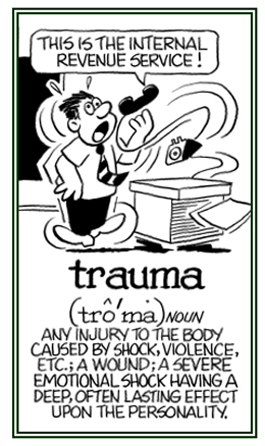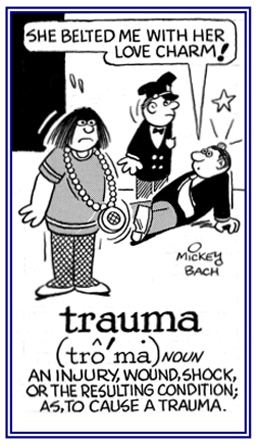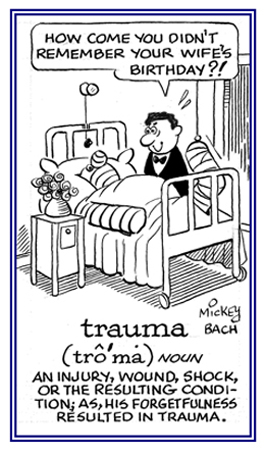2. An emotional wound or shock that creates substantial, lasting damage to the psychological development of a person: Mrs. Smith experienced a trauma when she suddenly lost her husband due to a skiing accident and she has also suffered from neurosis since then.
3. A situation or condition which produces extreme distress and disturbance: The disruption caused by the economic trauma of recession in the country was felt by all the people living there.
Trauma has both a medical and a psychiatric meanings:
- Medically, trauma refers to a serious or critical bodily injury, wound, or shock.
- In psychiatry, trauma has assumed a different meaning and refers to an experience that is emotionally painful, distressful, or shocking, which often results in lasting mental and physical conditions.



Go to this Word A Day Revisited Index
so you can see more of Mickey Bach's cartoons.

To avoid having acoustic trauma, people should wear protective ear plugs or ear-cover protectors to minimize damage to their ears when using loud equipment.
Everyone should be aware of risks of acoustic traumas that are connected with such activities as shooting guns, using chain saws, lawn mowers, driving motorcycles, or when using snowmobiles.
Another way of avoiding acoustic trauma is to refrain from listening to loud music for long periods of time.
Acoustic trauma can occur as a result of an individual's occupation, such as rock musicians, construction workers, airline ground crew members, or by using earphones and headphones, etc. with the volume turned up too much.
"The term cumulative trauma disorder is now also known as: repetitive strain injury, repetitive stress injury, repetitive stress syndrome, or repetitive motion injury."
Trauma has both a medical and a psychiatric definition. Medically, trauma refers to a serious or critical bodily injury, wound, or shock.
This definition is often associated with trauma medicine practiced in emergency rooms and represents a popular view of the term.
In psychiatry, trauma has assumed a different meaning and refers to an experience that is emotionally painful, distressful, or shocking, and which often results in long-term mental and physical effects.
